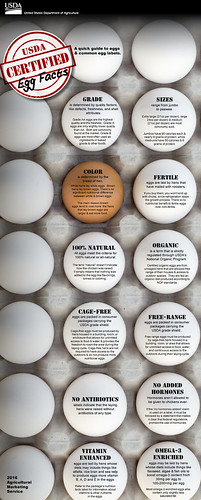
When it comes to purchasing eggs, consumers have interests that go well beyond what they see in the carton. For many buyers, where that egg came from and how it was produced are just as important as the finished product. Organic, locally produced, cage-free, and free range are just a few of the marketing claims consumers will find on the carton, as producers try to communicate the attributes of their product. To provide additional assurance to their customers of the validity of marketing claims, shell egg producers often enlist the services of USDA’s Agricultural Marketing Service (AMS).
In recent months, a long list of large volume food buyers – including restaurants, grocers, distributors and more – have announced they will transition to sourcing eggs and egg products only from cage-free production systems. You can learn more about this trend in a recent USDA Blog post. Many shell egg suppliers have already found a way to assure customers that products marketed as cage-free are indeed sourced from such systems: when USDA Graded eggs are also identified as cage-free, they must undergo a review process to verify the claim is truthful.
Through its Livestock, Poultry, and Seed Program, AMS provides shell egg quality grading and certification services to businesses on a voluntary, fee-for-service basis. Egg cartons bearing the USDA Grade Shield – usually either “USDA Grade AA” or “USDA Grade A” – must meet strict U.S. quality standards. In addition to verifying that eggs meet the stated grade, USDA’s highly-trained graders inspect processing facilities for proper sanitation and refrigeration, and verify proper identification and traceability methods such as code dating and plant numbers. Further, packaging materials that bear a USDA Grade Shield must be pre-approved by USDA to ensure the labeling is truthful and not misleading. This includes claims regarding the method of production (cage-free, free range, etc.), making the USDA Grade Shield a symbol of quality and integrity.
Not all USDA graded eggs are cage-free, and not all cage-free eggs are graded by USDA. But, eggs packed under a USDA Grade Shield and marketed as cage-free – or with any other production claim – must be source-verified by USDA through onsite farm visits, at least twice annually, to check that the laying hens are housed in the appropriate production system. For AMS approval, cage-free eggs must be produced by hens housed in a way that allows for not only unlimited access to food and water, but, unlike eggs from caged hens, also provides them the freedom to roam during the laying cycle.
We also know some consumers prefer their eggs to come from “free range” hens. For those eggs, we verify they are produced by hens that are not only housed in a way that allows for unlimited access to food and water and provides the freedom to roam within the area like cage-free hens but also gives the hens continuous access to the outdoors during their laying cycle.
At the processing facility, it’s not uncommon for cage-free eggs to be received alongside literally millions of non-cage-free eggs. So, AMS requires a written and implemented segregation and traceability plan detailing how the company maintains the identity of the eggs from production through storage, transport, processing, and packaging. Then, during packing, AMS verifies that only eggs sourced from the appropriate flocks are packaged into cartons bearing a USDA Grade Shield.
Whether you are an agricultural business wanting to differentiate your product in the marketplace or a consumer looking for quality eggs, AMS grading and certification services ensure that quality and marketing claims are verified from farm to table.
